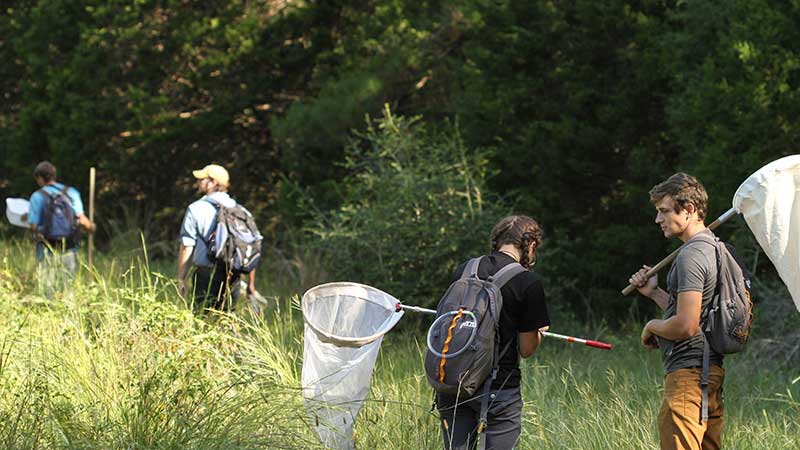Communities controlling knowledge through citizen science

This week is International Open Access Week and the theme this year is the question “Who Owns Our Knowledge?” The theme focuses on “how communities can reassert control over the knowledge they produce”, and asks us to reflect on “not only who has access to education and research but on how knowledge is created and shared, where it has come from, and whose voices are recognized and valued.”
During past International Open Access Weeks we have looked at the issue of control over knowledge by exploring the tensions between commercialisation and community, and open access models including diamond open access. In this blogpost we’ll be considering this year’s theme by highlighting the raising of the voices of ordinary people in research through participant engagement or ‘citizen science’.
What is citizen science?
Citizen science refers to research carried out by or involving the participation of the general public. The OED defines it as “scientific work undertaken by members of the general public, often in collaboration with or under the direction of professional scientists and scientific institutions”. In the 1990s the term started being used within the fields of sociology and zoology, however it is a far from recent phenomenon. In fact, the practice has existed for centuries with some dating it as far back as the 9th century and the monitoring of cherry blossom in Japan (OECD 2025).
The practice of research involving non-professional researchers can be found across many disciplines under a variety of terms including ‘participatory research’, ‘patient and public involvement’, ‘participatory action research’ and ‘crowd-sourced science’.
This video from Universitat de Barcelona introduces citizen science as a ‘bridge between research and people’ and highlights how participatory research enables ordinary people to play an active role in scientific research.
Thousands of people are citizen scientists, involved in diverse projects from monitoring the flowering of fruit trees to investigating airborne microplastics in the home. The Zooniverse platform which claims to utilise ‘the wisdom of the crowd’ has almost 3 million volunteers contributing to research projects by carrying our research tasks such as classification.
Members of the public participate in research projects in many ways and at different levels: they can be contributors, collaborators, co-creators and independent researchers. They may also be involved at different stages of the research: from initial conception of the project and data collection to analysis and the dissemination of research findings.
Why include the public?
There are several reasons why citizen science is good for research.
Firstly, it increases the scope of data collection. Public participation in research can provide access to data that otherwise might not be reachable, for example sensitive or personal data.
Secondly, public participation can increase the effectiveness of research in addressing social problems. Including citizens in the development of projects can ensure that research questions are directed towards the issues that really matter to them, including marginalised and under-served groups (OECD 2025: 25).
Thirdly, the engagement of participants in the carrying out of research democratises and enables the sharing of power within research. Open research may make research practices transparent and accessible through the sharing of publications, data and resources, but how open is research to the communities and people that might be featured in these studies?
Opening up research beyond the domain of the academy to include ordinary people and recognise them for the knowledge that is rooted in their unique experiences can empower the people at the heart of research studies. The Institute of Development Studies advocates the use of participatory methods to enable citizens “to play an active and influential role in decisions that affect their lives”. Added to this, when done with transparency and inclusivity “it can increase trust in science, policy and scientific authorities” (OECD 2025: 25).
Challenges
Whilst offering potential benefits, involving citizen scientists can present challenges that researchers need to negotiate at some point in their research projects.
One set of challenges is presented by the many barriers facing people who might want to participate in research, for example the research location, physical access, time, language, financial cost, and access to technology (OECD 2025: 32).
Added to this are the issues of data quality and potential bias. The skills and behaviour of citizen scientists can have an impact upon the quality of the data collected, so it is important that they are given appropriate training to carry out required tasks effectively.
Finally, there may also be ethical and legal issues to consider, relating to copyright, confidentiality, data sharing agreements, credit and recognition on publications, and environmental impact (OECD 2025). Non-professionals contribute significantly to many research projects and deserve something in return for their efforts so researchers may want to consider offering some form of remuneration or another incentive.
Researchers in the university’s Institute for Community Research and Development have written an article on ‘community peer research’ which explores the benefits and challenges in using a participant-based approach. Through six case studies they highlight their experiences, learning and make recommendations for others carrying out similar research.
Final words
Ordinary people clearly offer huge potential to researchers and their research and harnessing this power is crucial to finding answers to some of the most pressing questions facing the world.
If you’d like to find out more about the topic, there are some resources below.
Further reading:
Citizen Science: Theory and Practice (open access journal focusing on the field of citizen science)
Embedding citizen science into research policy (OECD Science, Technology and Industry Policy Paper)
Creating Synergies between Citizen Science and Indigenous and Local Knowledge (journal article exploring the relationship between indigenous knowledge and citizen science)
Citizenscience.eu (platform for sharing knowledge, tools, training and resources for citizen science)
What is citizen science and why should policymakers care? (blog post from OECD)
Sarah Dar, Scholarly Communications Officer
Image credit: Raw Pixel CC0
For more information please contact the Corporate Communications Team.


/prod01/wlvacuk/media/departments/digital-content-and-communications/images-2024/Architecture-students-tree-planting.png)
/prod01/wlvacuk/media/departments/digital-content-and-communications/images-2024/250630-SciFest-1-group-photo-resized-800x450.png)
/prod01/wlvacuk/media/departments/digital-content-and-communications/images-2024/Andy-Lane-WLV.jpg)
/prod01/wlvacuk/media/departments/digital-content-and-communications/submitted-news-images/Children-screening.jpg)
/prod01/wlvacuk/media/departments/digital-content-and-communications/submitted-news-images/GIC-Block-A-Visual-2----Entrance.jpg)